10 Recommended AI Courses for Executive Directors in 2025
Discover the top 10 AI courses tailored for executive directors in 2025, designed to enhance leadership skills and strategic decision-making. Equip yourself with cutting-edge insights to stay competitive in the evolving tech-driven business landscape.

As artificial intelligence (AI) continues to progress, its influence on the business landscape is profound, with Executive Directors standing at the forefront of this transformation. The growing presence of AI across industries underscores the necessity for Executive Directors to embrace upskilling, ensuring they remain competitive and informed in their roles. The rapid integration of AI solutions presents both opportunities and challenges, making it crucial for leaders to understand its implications on job functions and organizational strategies.
Why AI matters for Executive Directors today
Today, AI is not just a technological trend but a pivotal component of strategic business planning. For Executive Directors, understanding AI is imperative, as 69% of businesses now incorporate AI into their operations to boost efficiency and innovation. This article aims to guide Executive Directors in selecting the most suitable AI courses, enabling them to leverage AI tools effectively within their organizations. By identifying the right educational paths, directors can enhance their decision-making capabilities and drive their companies toward sustained growth.
The Growing Role of AI in Executive Directors
AI is transforming the role of Executive Directors in several key ways. Automation streamlines routine tasks, allowing directors to focus on strategic initiatives. AI-driven decision-making tools provide data-driven insights, enhancing the accuracy and speed of business decisions. Moreover, AI facilitates personalized experiences for stakeholders, fostering stronger relationships and improved outcomes. As AI reshapes workflows, Executive Directors are tasked with integrating these technologies into their operational frameworks, ensuring a seamless transition to AI-driven processes.
Benefits of becoming an AI expert in Executive Directors
For Executive Directors, gaining expertise in AI offers numerous advantages. It enhances their ability to lead digital transformation initiatives, ensuring their organizations remain competitive in a tech-driven market. An AI-savvy director can better anticipate industry trends, optimize resource allocation, and foster innovation within their teams. Additionally, understanding AI helps in navigating ethical considerations and managing the potential risks associated with AI technologies. By investing in AI education, Executive Directors can position themselves as forward-thinking leaders ready to tackle the challenges and opportunities of tomorrow.
This article will compare 10 AI courses suited for Executive Directors, including the highly regarded CompleteAI Training, which offers a comprehensive suite of video courses and certifications specifically designed for executive professionals. Each course provides distinct insights and skill sets, enabling directors to find the perfect fit for their educational needs and career objectives.

Comparison: All AI Courses for Executive Directors (Updated Q2' 2025)
| Course Name | Provider | Price | Key Topics | Pros | Cons | Best For |
|---|---|---|---|---|---|---|
| AI for Executive Directors | Complete AI Training | $29/month or $8.25/month billed annually | Specialized video courses, certifications, AI tools, industry news | Highest rating, Extensive courses, Daily updates, Affordable pricing | Subscription based | Executive Directors professionals |
| AI for Directors and Organisational Leaders Programme , CMI Level 7 | In-Professional Development (INPD) | $1,740,$2,340 | AI impact, opportunities, risks, governance | Tailored for senior leaders, CMI qualification, Flexible delivery | High price, Written assignment required | General learners |
| AI Fluency for Directors Sprint | Australian Institute of Company Directors (AICD) | Contact provider | AI knowledge, governance, strategy | Expert-led, Practical knowledge, Networking opportunities | Price not disclosed, Intensive schedule | General learners |
| Generative AI for Executives and Business Leaders Specialization | IBM AI Academy via Coursera | $39,$79/month | Generative AI, business impact, ethics | No prior AI knowledge required, Flexible schedule | Foundational knowledge only, Subscription-based | General learners |
| GenAI in Business: Discover the Possibilities | University of Michigan via Coursera | $39,$79/month | Generative AI applications, innovation | Real-world applications, Flexible format | Requires subscription for certificate | General learners |
| GenAI in Business: Strategies for Successful Execution | University of Michigan via Coursera | $39,$79/month | AI strategic frameworks | Strategic focus, Practical frameworks | Requires subscription for certificate | General learners |
| GenAI in Business: Planning Framework for Implementation | University of Michigan via Coursera | $39,$79/month | AI adoption planning tools | Practical planning tools, Executive-level focus | Requires subscription for certificate | General learners |
| AI for Senior Executives & CSuite Program | MIT xPRO | $7,000,$10,000 | AI frameworks, leadership, machine learning | MIT faculty, Hands-on workshops, Networking | High cost, Time commitment | General learners |
| Artificial Intelligence: Implications for Business Strategy | MIT Sloan School of Management | $3,200 | AI technologies, business strategy | Renowned faculty, Practical applications | High cost, Time commitment | General learners |
| Leadership Program in AI and Analytics | Wharton Executive Education | $7,000,$9,000 | AI fluency, machine learning, responsible AI | Practical tools, Global peer network | High cost, Time commitment | General learners |
Understanding AI Training for Executive Directors Professionals
With AI becoming an integral part of business strategy, executive directors need to stay informed and equipped with the latest AI knowledge to lead their organizations effectively. Numerous courses are now available to cater specifically to executive directors, offering a variety of learning experiences, from comprehensive video libraries to intensive in-person workshops. This article provides a detailed comparison of some of the best AI courses tailored for executive directors, helping professionals select the right fit for their learning needs.
Course 1: CompleteAI Training
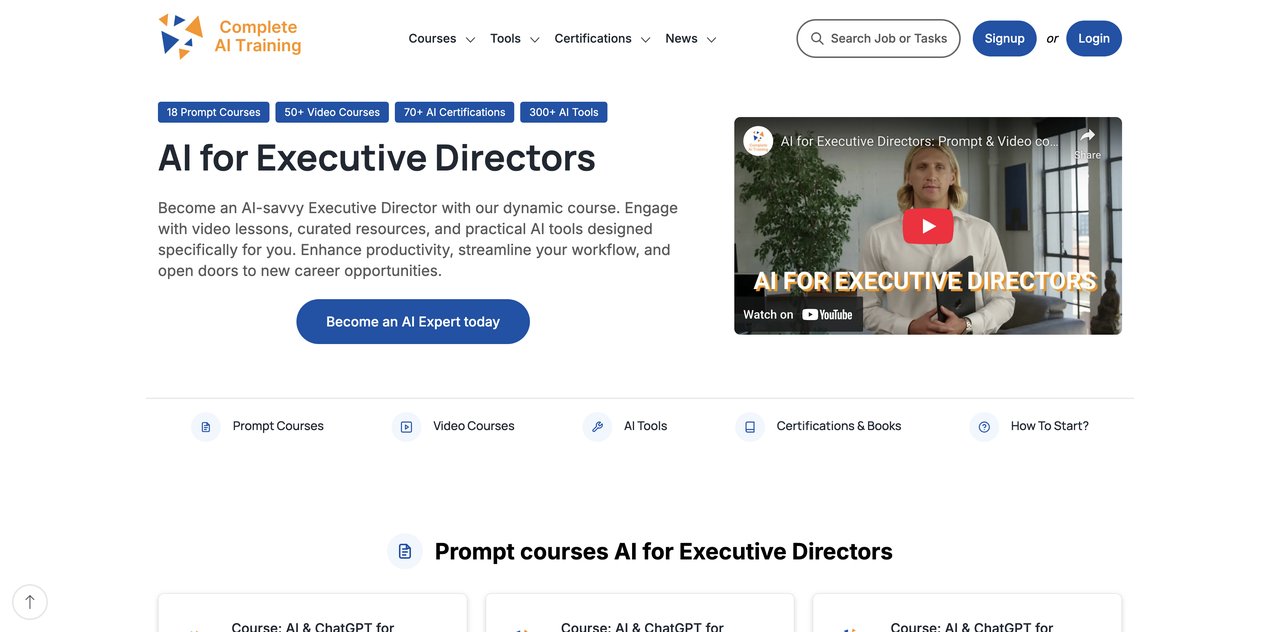
CompleteAI Training offers an extensive library of over 100 video courses and certifications specifically designed for executive directors. The platform provides comprehensive AI education, daily updates on the latest AI tools, and curated industry news that is directly relevant to executive leadership. With a subscription, learners have continuous access to a wealth of resources, making it a cost-effective option for ongoing education.
Key Topics Covered: AI tools and applications, industry news updates, leadership insights in AI.
Target Audience and Skill Level Requirements: Executive directors with a basic understanding of AI who are looking to deepen their knowledge and stay current with AI trends.
- Pros:
- Offers the highest rating and most comprehensive offering for executive directors.
- Extensive range of AI courses and certifications.
- Daily updates on AI tools and news.
- Affordable pricing with annual billing option.
- Cons:
- Subscription-based model necessitates continuous learning.
Who Would Benefit Most: Executive directors seeking a broad, flexible, and ongoing AI education.
Learn more about CompleteAI Training for Executive Directors
Course 2: AI for Directors and Organisational Leaders Programme , CMI Level 7 by In-Professional Development (INPD)
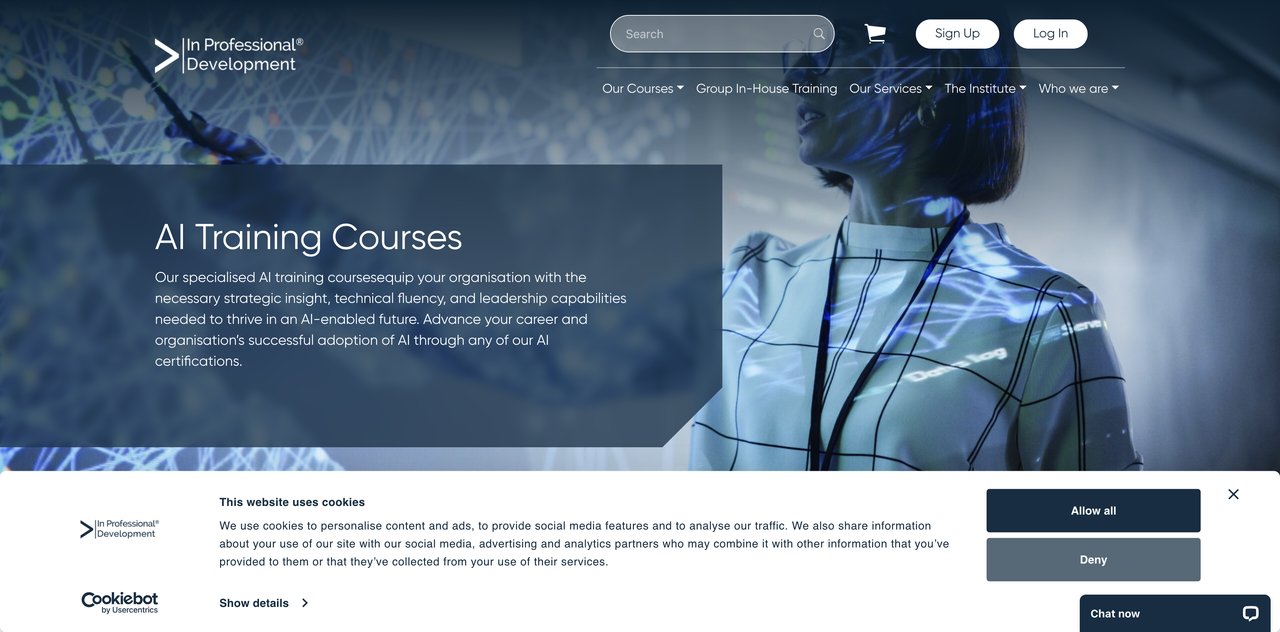
This two-day course is designed for executive directors and senior leaders to understand AI’s impact, opportunities, risks, and governance for effective business integration. Participants receive a CMI Level 7 Award in Strategic Management and Leadership Practice, adding a recognized qualification to their credentials.
Key Topics Covered: AI impacts, opportunities and risks, governance, strategic management.
Target Audience and Skill Level Requirements: Senior leaders and directors looking to integrate AI into their business strategy.
- Pros:
- Tailored for senior leaders and directors.
- Includes recognized CMI qualification.
- Covers practical, ethical, and strategic AI aspects.
- Flexible delivery modes (virtual, in-person, in-house).
- Cons:
- High cost may be a barrier.
- Requires commitment to a written assignment.
Who Would Benefit Most: Senior executives seeking practical and strategic AI insights with a formal qualification.
Learn more about this programme
Course 3: AI Fluency for Directors Sprint by Australian Institute of Company Directors (AICD)

This intensive two-week online course is designed for senior executives and company directors. It aims to build essential AI knowledge and strengthen AI literacy for confident organizational leadership. Participants learn real-world AI concepts, governance, and strategy, and earn a digital badge upon completion.
Key Topics Covered: AI concepts, governance, strategy, organizational leadership.
Target Audience and Skill Level Requirements: Senior executives and directors seeking to enhance their AI literacy and leadership skills.
- Pros:
- Expert-led by top AI specialists and industry leaders.
- Practical and actionable AI knowledge.
- Networking opportunities with peers.
- Flexible online format.
- Cons:
- Price not disclosed upfront; requires registration inquiry.
- Intensive schedule may require significant time commitment.
Who Would Benefit Most: Busy executives looking for a short, intensive course that enhances AI fluency.
Course 4: Generative AI for Executives and Business Leaders Specialization by IBM AI Academy via Coursera
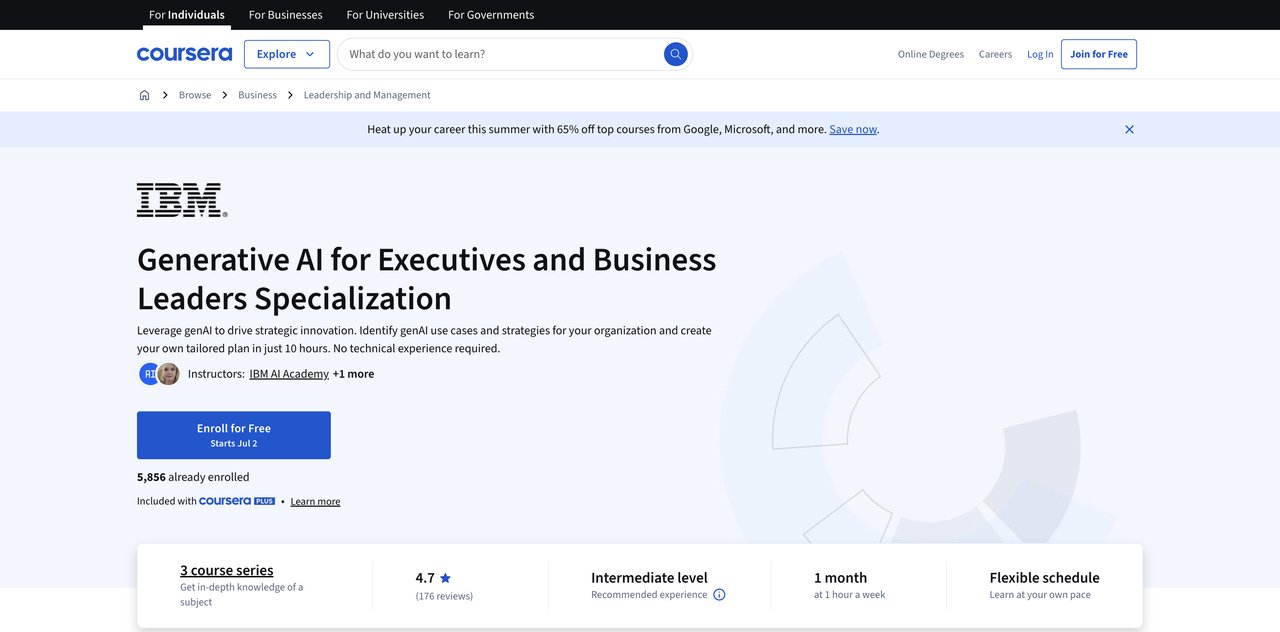
This beginner-friendly specialization focuses on foundational knowledge of generative AI and its business impact. The course covers AI history, ethics, governance, and practical business applications, making it suitable for leaders with no prior AI experience.
Key Topics Covered: AI history, ethics, governance, business applications.
Target Audience and Skill Level Requirements: Business leaders and executives new to AI.
- Pros:
- No prior AI knowledge required.
- Flexible schedule and self-paced learning.
- High learner satisfaction (4.6/5 rating).
- Focus on business applications and ethical considerations.
- Cons:
- Limited to foundational and strategic knowledge.
- Subscription-based after free trial.
Who Would Benefit Most: Executives starting their AI journey and looking for a flexible, introductory course.
Learn more about this specialization
Course 5: GenAI in Business: Discover the Possibilities by University of Michigan via Coursera
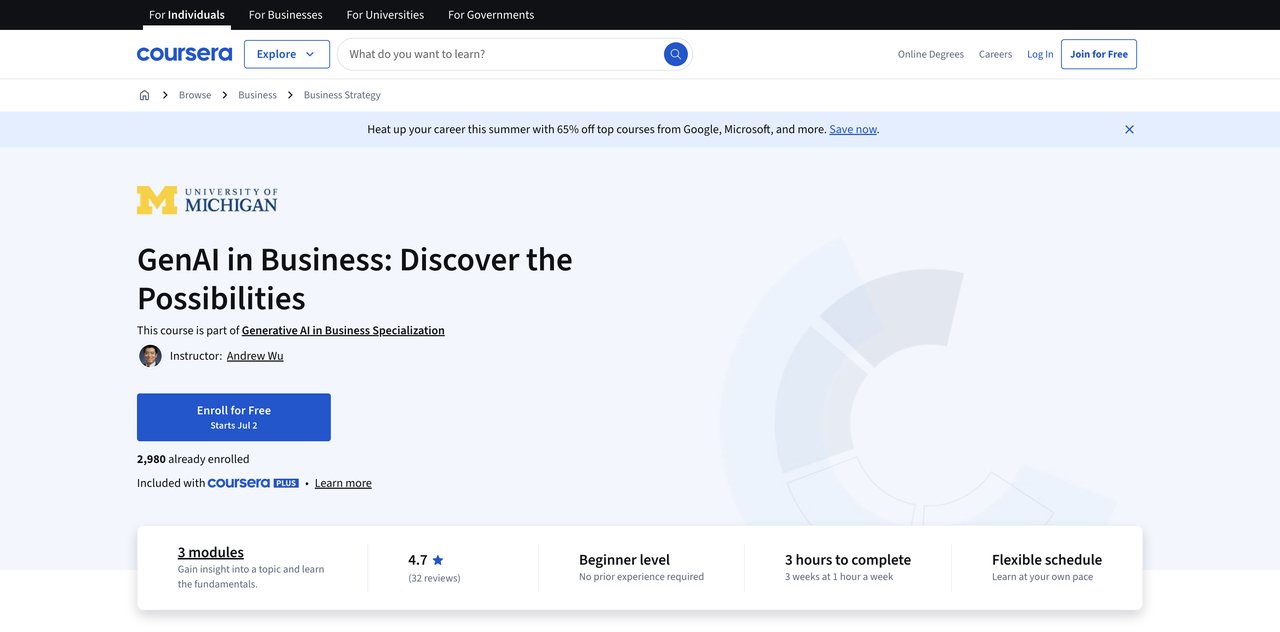
This course explores the potential applications of generative AI in business contexts, helping executive directors understand how GenAI can drive innovation and transformation. It offers a flexible online format suitable for executive-level learners.
Key Topics Covered: Generative AI applications, business transformation, innovation.
Target Audience and Skill Level Requirements: Executive directors looking to apply AI in business innovation.
- Pros:
- Focuses on real-world business applications.
- Suitable for executive-level learners.
- Flexible online format.
- Cons:
- Requires Coursera subscription for certificate.
- Not deeply technical.
Who Would Benefit Most: Executives interested in leveraging AI for business innovation.
Course 6: GenAI in Business: Strategies for Successful Execution by University of Michigan via Coursera
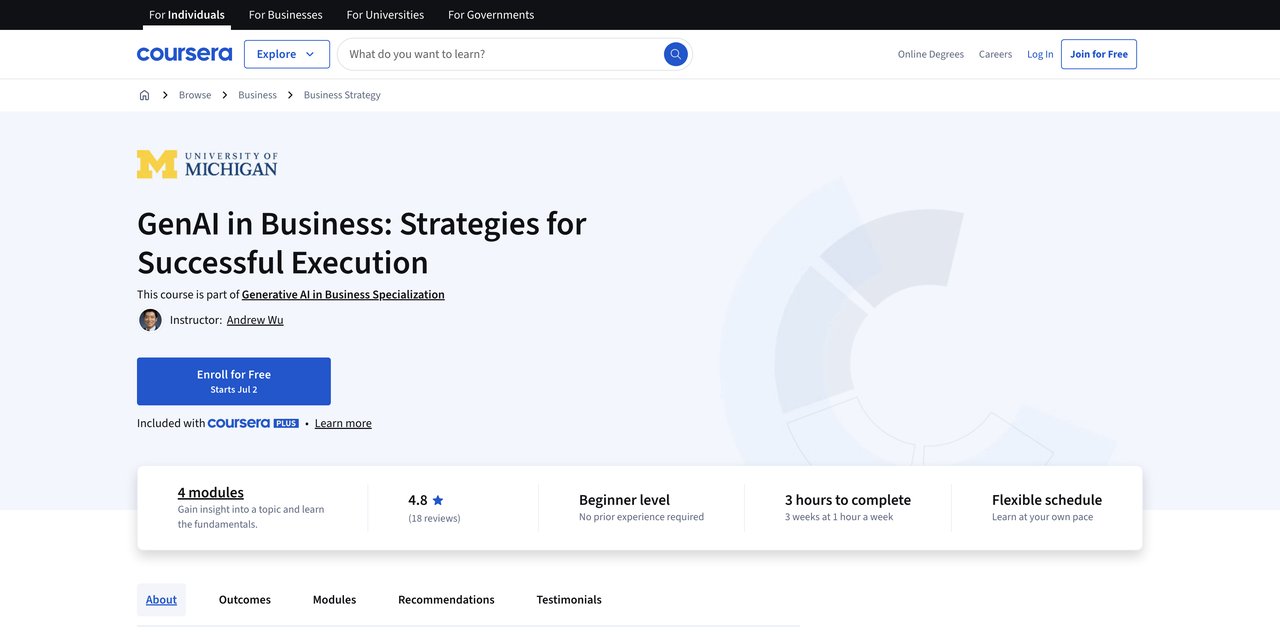
This course covers strategic frameworks for implementing generative AI initiatives effectively in business. It is designed for executive directors and leaders aiming to integrate AI into their strategic planning.
Key Topics Covered: Strategic frameworks, AI implementation, business strategy.
Target Audience and Skill Level Requirements: Executive leaders focused on strategic AI integration.
- Pros:
- Strategic focus for executive leaders.
- Practical frameworks for AI implementation.
- Flexible online learning.
- Cons:
- Requires Coursera subscription for certificate.
- Not deeply technical.
Who Would Benefit Most: Leaders strategizing AI integration in business processes.
Course 7: GenAI in Business: Planning Framework for Implementation by University of Michigan via Coursera
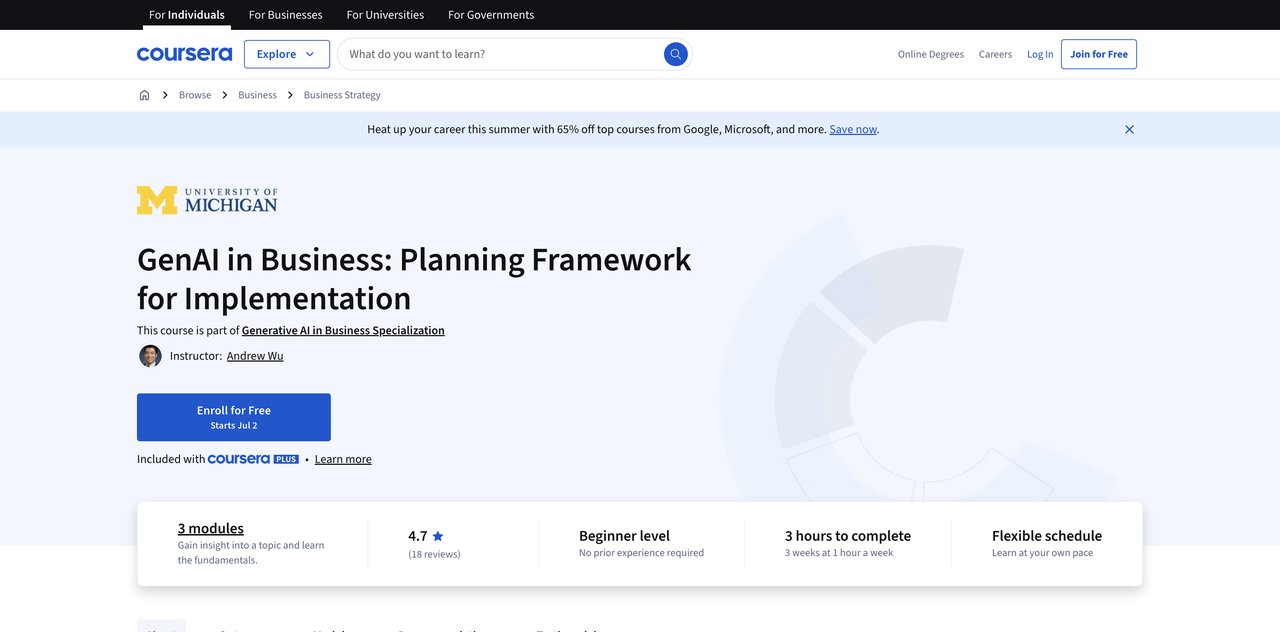
This course offers practical planning tools and frameworks for AI adoption in business. It is aimed at executive directors and business leaders looking to effectively plan and execute AI initiatives.
Key Topics Covered: Planning tools, AI adoption, business frameworks.
Target Audience and Skill Level Requirements: Business leaders planning AI adoption strategies.
- Pros:
- Practical planning tools for AI adoption.
- Executive-level focus.
- Flexible online format.
- Cons:
- Requires Coursera subscription for certificate.
- Not deeply technical.
Who Would Benefit Most: Executives planning to adopt AI solutions in their business.
Course 8: AI for Senior Executives & CSuite Program by MIT xPRO

This 6-7 month hybrid program is designed for senior executives leading AI initiatives. It covers AI frameworks, leadership, machine learning, generative AI, and organizational readiness, offering live sessions and personalized mentorship.
Key Topics Covered: AI frameworks, leadership, machine learning, organizational readiness.
Target Audience and Skill Level Requirements: Senior executives leading AI initiatives.
- Pros:
- Learn from MIT CSAIL faculty and research leaders.
- Hands-on workshops and leadership simulations.
- Personalized mentorship and global networking.
- Certificate of completion from MIT xPRO.
- Cons:
- High cost.
- Significant time commitment.
Who Would Benefit Most: Senior executives looking for an in-depth and comprehensive AI leadership program.
Course 9: Artificial Intelligence: Implications for Business Strategy by MIT Sloan School of Management
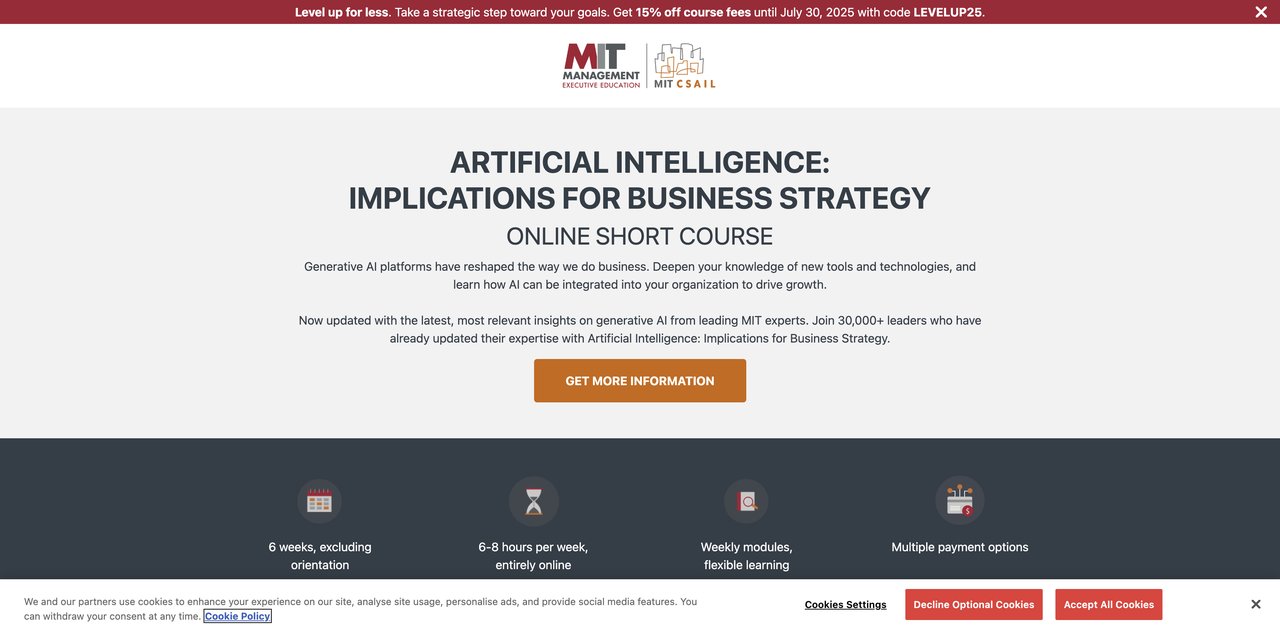
This 6-week online program is tailored for C-suite and senior leaders, focusing on AI technologies from a business strategy perspective. The course includes a strategic AI capstone project and emphasizes governance and ethical adoption.
Key Topics Covered: Business strategy, AI technologies, governance, ethical adoption.
Target Audience and Skill Level Requirements: C-suite and senior leaders aiming to integrate AI into business strategy.
- Pros:
- Taught by renowned MIT faculty.
- Flexible weekly modules.
- Practical applications and capstone project.
- Certificate from MIT Sloan.
- Cons:
- High cost for a short program.
- Requires time commitment.
Who Would Benefit Most: Senior leaders looking to incorporate AI into their strategic planning.
Course 10: Leadership Program in AI and Analytics by Wharton Executive Education
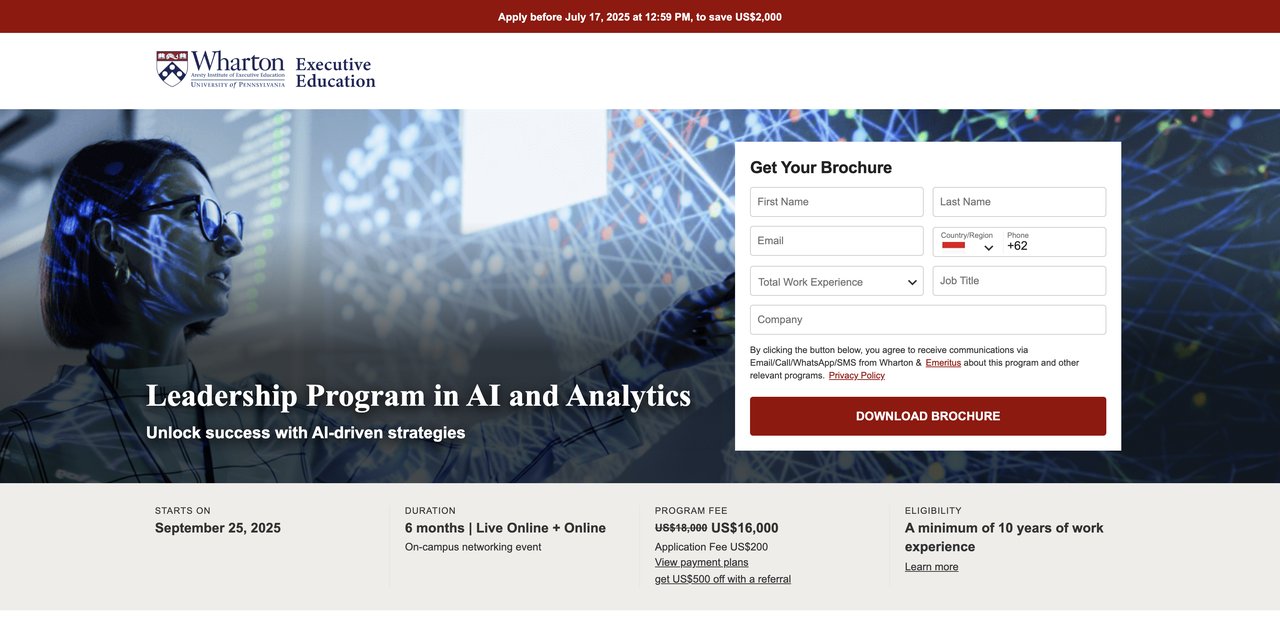
This 6-month hybrid program is designed for CTOs, CIOs, and innovation leaders, focusing on strategic fluency in AI, machine learning, data-driven decision-making, and responsible AI governance. The program includes a board-ready AI implementation capstone project.
Key Topics Covered: AI and machine learning, data-driven decision-making, AI governance.
Target Audience and Skill Level Requirements: CTOs, CIOs, and innovation leaders seeking strategic AI fluency.
- Pros:
- Practical tools and leadership agility focus.
- Access to global peer network and expert faculty.
- Optional in-person networking event.
- Cons:
- High cost.
- Requires significant time commitment.
Who Would Benefit Most: Innovation leaders and C-suite executives seeking strategic AI expertise.
Overall Recommendations
For executive directors seeking a comprehensive and ongoing learning experience, CompleteAI Training offers the most extensive range of resources at an affordable price. However, those looking for a more intensive, short-term commitment might find value in the AI for Directors and Organisational Leaders Programme by INPD, which provides a recognized qualification. For senior executives aiming for strategic AI leadership, the AI for Senior Executives & CSuite Program by MIT xPRO provides comprehensive in-depth learning. Each course offers unique benefits, and the right choice will depend on specific learning objectives, budget, and time availability.




